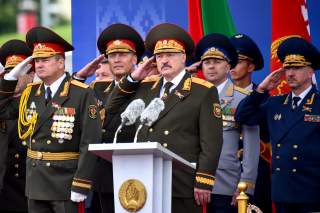Belarus Is Trying to Weave a New National Identity
It is a large and uncertain undertaking.
Whatever its precise historicity, Lukashenko’s critique of the BNR’s failure to ensure its own sovereignty functions as a kind of national parable that mirrors the state’s current rhetoric regarding the precarity of Belarus’s strategic position. Moreover, the official rhetoric warns of the necessity of charting an independent foreign policy to avoid becoming dependent on the graces of the surrounding great powers.
In this way, although Lukashenko’s comments were still broadly critical of the legacy of the BNR, his framing of its historical challenges as being one in the same with that of Belarus today nevertheless creates a line of narrative continuity between the BNR and the modern Belarusian state. It serves to instill further the idea that navigating the space between the poles of geopolitical power has always been an intrinsic part of the Belarusian national experience.
State-media was even more explicit in charting a unifying synthesis of Belarus’s past and present. In a contemporaneous column published major state-owned newspaper Belarus Segodnya, the director of the History Institute of the National Academy of Sciences of Belarus wrote that the BNR was a “logical continuation of the previous struggle of Belarusian organizations and political parties for the realization of the idea of national statehood.” Additionally, the newspaper argued that although BNR’s founders failed to maintain Belarusian sovereignty due to “contradictory internal and geopolitical conditions,” their efforts nevertheless helped to irreversibly establish the international legitimacy of Belarusian aspirations to statehood in the eras to come.
In the emerging state ideology, each successive era of Belarusian history provides a thematic component in a single overarching narrative of statehood. The histories of the Polish-Lithuanian Commonwealth and BNR provide evidence of Belarus’s historical linkages to the West, but the tragic fate of both states also serves as a reminder of the enveloping perils of great power strategic competition. The apocalyptic experience of the World War II reinforces the value of peace and the country’s close kinship with its Russian neighbors. Additionally, the stable years of the mid-century Soviet Union serve as a reminder of the value of the implicit social contract between the state and its people. In this context, the challenge unleashed by the crisis in Ukraine becomes the latest iteration of the longer historical struggle to maintain Belarusian sovereignty and domestic stability amidst regional upheaval.
There is substantial evidence that this model for Belarus’s place in the world is one that broadly resonates with its people, and that the ideological discourse on identity is as much guided by the popular mood below as dictates from above. When Belarusians were asked in a 2016 survey conducted by independent pollster IISEPs as to whether they supported NATO or Russia’s increased deployment of military forces in Europe, a majority of respondents (57 percent) indicated support for neither side’s actions and this was especially the case among the younger cohorts of the population. Similarly, a 2018 EU Neighbors survey found equal levels of trust (47 percent) among Belarusians in both the European and Eurasian Economic Unions and that 61 percent of the population characterized “peace, stability and security” as key values.
Despite the broad public support for the new ideological and foreign-policy platforms, and collaboration with civil society in culture, there is nevertheless also a concern in the perennially conservative halls of Belarusian officialdom about the potential knock-on effects of these changes. The authorities therefore still reserve more traditionally coercive methods to impose margins on what constitutes acceptable discussion in society. This includes cracking down on what it deems to be excessively pro-Russian as well as opposition-minded bloggers and websites. Furthermore, the state has moved to lend itself extensive new powers governing usage of the internet. Lukashenko, who has compared the destructive power of ‘information war’ to that of nuclear weapons, clearly believes that direction of the public discourse should not be ceded from the state’s guiding hand.
Although the realization of a neutral foreign policy for Belarus is likely always to be constrained in practice by the strategic and economic imperatives of its position, principles of national identity are more statements of an aspiration than a reflection of reality. No country has ever been born from an unbroken lineage of character; over the course of many years both states and the people living within them pick and choose, reinterpret or discard, the values, symbols and mythologies of the past that help to bind them to a common purpose in the present.
The international system now appears poised to enter a dangerous transitional phase marked by the revival of great power competition. Across the world, numerous long-established political institutions have found themselves roiled by the forces of reaction and alienation. Much uncertainty remains as to whether Belarus’ cautious treading of the middle ground will prove sufficient to insulate it from the same geopolitical forces upending much of the world. It is also unclear whether a national ethos that remains equal parts artificial and sincerely-felt will prove capable of uniting the country in such uncertain and divisive times.
Yet no matter these challenges, in the emerging coalescence of many historical narratives of Belarus’s past into a singular articulation of Belarusian national values in the present, one sees the outlines of a maturing society. This new society is appreciative of its distinctive features and increasingly equipped with a common language with which to navigate the world well into the future.
Thomas Dolzall is an intern at the National Interest.
Image: Reuters

